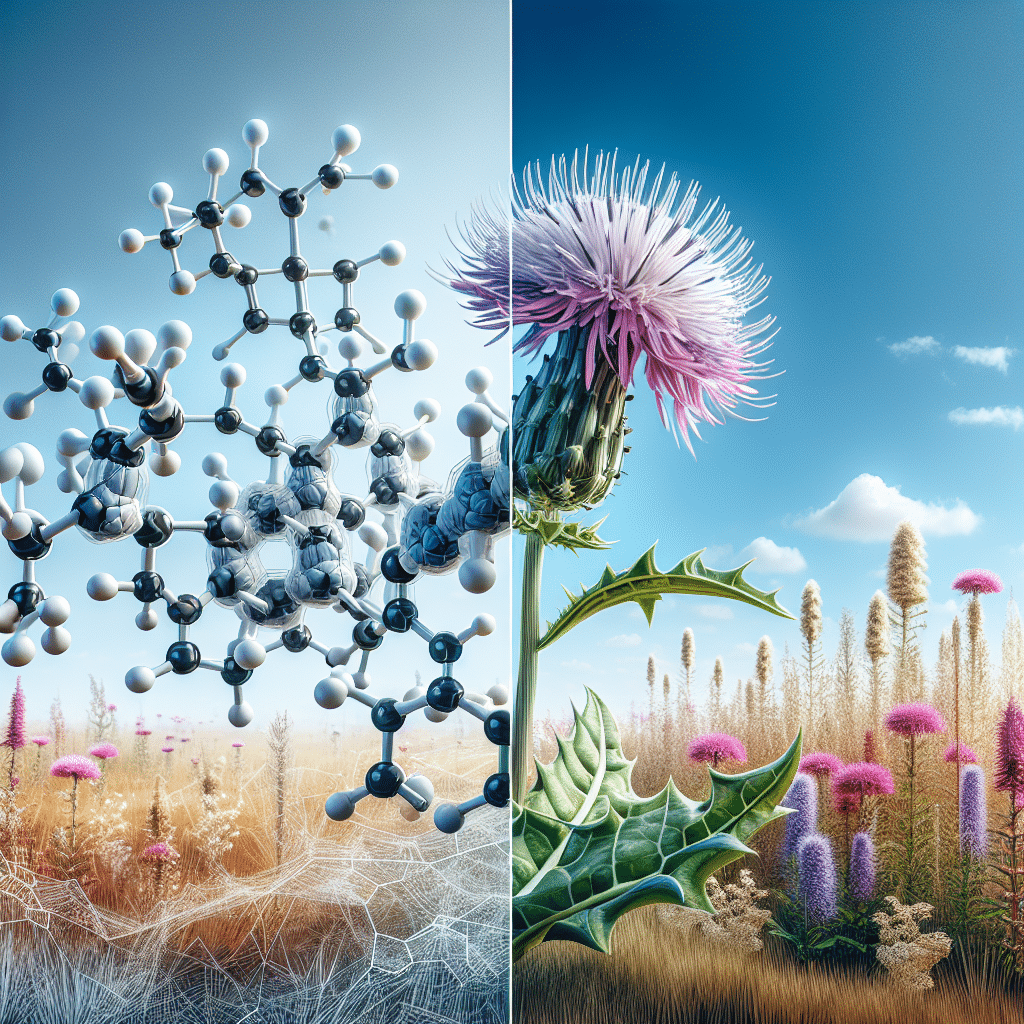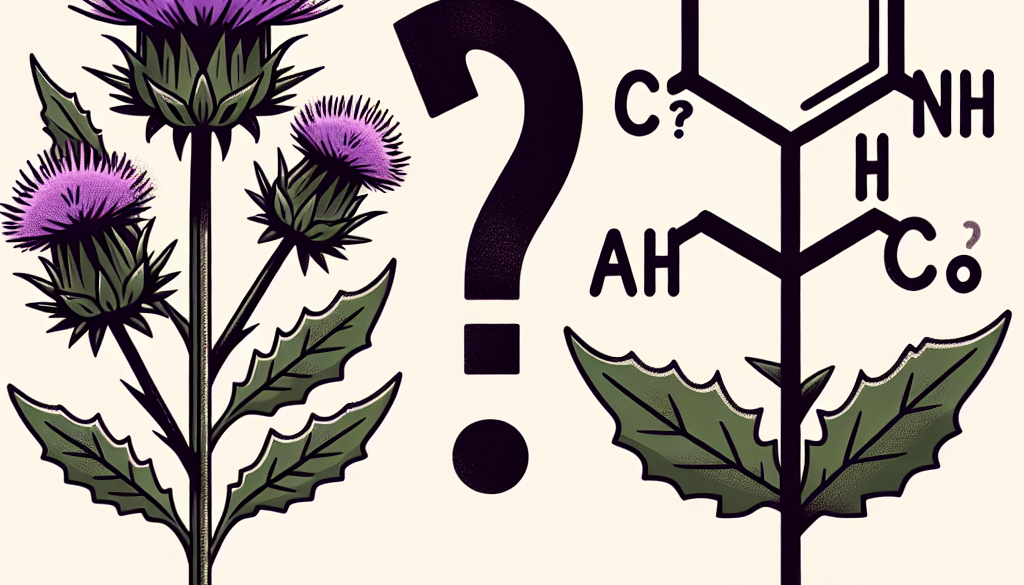Is Silymarin and Milk Thistle the Same Thing?
-
Table of Contents
- Silymarin and Milk Thistle: Understanding the Difference
- What is Milk Thistle?
- What is Silymarin?
- Are Silymarin and Milk Thistle the Same Thing?
- Benefits of Milk Thistle and Silymarin
- Scientific Research on Silymarin and Milk Thistle
- How to Use Milk Thistle and Silymarin
- Potential Side Effects and Interactions
- Conclusion: Key Takeaways on Silymarin and Milk Thistle
- Discover ETchem’s Protein Products
Silymarin and Milk Thistle: Understanding the Difference

When it comes to herbal supplements, few have garnered as much attention as milk thistle and its active component, silymarin. Often used interchangeably in conversation, these terms actually refer to different aspects of the same plant. This article will delve into the nuances between silymarin and milk thistle, exploring their uses, benefits, and the scientific research that backs them up.
What is Milk Thistle?
Milk thistle (Silybum marianum) is a flowering herb related to the daisy and ragweed family. It is native to Mediterranean countries but can now be found throughout the world. The plant is distinguished by its purple flowers and white-veined leaves, from which its name is derived. Milk thistle has been used for over 2,000 years as a natural remedy for various health conditions, particularly liver problems.
What is Silymarin?
Silymarin is the main active ingredient found in the seeds of the milk thistle plant. It is a complex mixture of flavonolignans, which includes silybin, silydianin, and silychristin, with silybin being the most potent and abundant. Silymarin is what gives milk thistle its therapeutic properties and is often extracted and used in supplements.
Are Silymarin and Milk Thistle the Same Thing?
While silymarin and milk thistle are closely related, they are not the same thing. Milk thistle is the plant itself, and silymarin is the active compound found within the plant’s seeds. Most milk thistle supplements contain silymarin extract, which is why the terms are frequently used interchangeably. However, it’s important to distinguish between the whole plant and the extract when discussing their respective benefits and uses.
Benefits of Milk Thistle and Silymarin
Both milk thistle and silymarin are best known for their liver-protective effects. Here are some of the benefits that have been associated with these substances:
- Liver Health: They are commonly used to treat liver conditions such as hepatitis, cirrhosis, jaundice, and gallbladder disorders.
- Antioxidant Properties: Silymarin acts as an antioxidant, protecting the body from oxidative stress and free radical damage.
- Anti-inflammatory Effects: They may help reduce inflammation, which is beneficial for various health conditions.
- Anti-Cancer Potential: Some studies suggest that silymarin may have anti-cancer properties, though more research is needed in this area.
Scientific Research on Silymarin and Milk Thistle
Over the years, numerous studies have been conducted to evaluate the effectiveness of milk thistle and silymarin. Here are some key findings:
- A review of clinical trials found that silymarin can improve liver function in people with liver diseases.
- Research suggests that silymarin may help protect the liver from toxins like alcohol and certain drugs.
- Some animal studies indicate that milk thistle may help to stabilize blood sugar levels, which could be beneficial for those with diabetes.
Despite these promising results, more research is needed to fully understand the extent of milk thistle and silymarin’s health benefits and their mechanisms of action.
How to Use Milk Thistle and Silymarin
Milk thistle and silymarin are available in various forms, including capsules, tablets, powders, and liquid extracts. The dosage can vary depending on the concentration of silymarin in the supplement and the condition being treated. It’s important to follow the manufacturer’s instructions or consult with a healthcare provider before starting any new supplement regimen.
Potential Side Effects and Interactions
While milk thistle and silymarin are generally considered safe, they can cause side effects in some people. These may include gastrointestinal issues, allergic reactions, and headaches. Additionally, milk thistle may interact with certain medications, so it’s crucial to consult with a healthcare professional before using it, especially if you are taking prescription drugs.
Conclusion: Key Takeaways on Silymarin and Milk Thistle
In conclusion, while silymarin and milk thistle are related, they are not the same. Silymarin is the active compound found in milk thistle seeds, and it is responsible for the plant’s health benefits. Both have been shown to support liver health and offer antioxidant and anti-inflammatory properties. However, it’s essential to use these supplements under the guidance of a healthcare provider to avoid potential side effects and interactions.
Discover ETchem’s Protein Products
If you’re interested in enhancing your health regimen, consider exploring ETchem’s range of protein products. ETchem is a reputable manufacturer and supplier of high-quality collagens, including marine, fish, bovine, chicken, and various types of collagen. Their products are perfect for those looking to support their health and wellness goals.
About ETChem:
ETChem, a reputable Chinese Collagen factory manufacturer and supplier, is renowned for producing, stocking, exporting, and delivering the highest quality collagens. They include marine collagen, fish collagen, bovine collagen, chicken collagen, type I collagen, type II collagen and type III collagen etc. Their offerings, characterized by a neutral taste, instant solubility attributes, cater to a diverse range of industries. They serve nutraceutical, pharmaceutical, cosmeceutical, veterinary, as well as food and beverage finished product distributors, traders, and manufacturers across Europe, USA, Canada, Australia, Thailand, Japan, Korea, Brazil, and Chile, among others.
ETChem specialization includes exporting and delivering tailor-made collagen powder and finished collagen nutritional supplements. Their extensive product range covers sectors like Food and Beverage, Sports Nutrition, Weight Management, Dietary Supplements, Health and Wellness Products, ensuring comprehensive solutions to meet all your protein needs.
As a trusted company by leading global food and beverage brands and Fortune 500 companies, ETChem reinforces China’s reputation in the global arena. For more information or to sample their products, please contact them and email karen(at)et-chem.com today.




